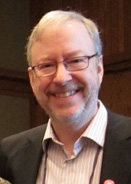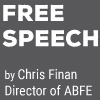Banned in Boston: The Battle Begins
“Free Speech” is a monthly column by Chris Finan, director of American Booksellers for Free Expression (ABFE), that shares his personal thoughts and opinions on a broad range of free expression issues; the views expressed do not necessarily reflect those of the American Booksellers Association. Finan welcomes comments and suggestions at [email protected].

H.L. Mencken was born to be banned.
Beginning life as a Baltimore newspaper reporter, he developed a cynical view of average Americans, whom he dubbed “the booboisie.” “No one ever went broke underestimating the intelligence of the American middle class,” he famously remarked.
Mencken’s wit found a ready audience in the 1920s. The country had grown disillusioned with democratic pieties, and he developed a national reputation as a columnist and literary critic. He was particularly scathing in his coverage of the trial of John Scopes, who was prosecuted for teaching evolution in Tennessee in 1925.
By then, Mencken had his own magazine, American Mercury, which included authors whose language was often as ferocious as the editor’s. As a professional incendiary, Mencken rarely worried that he might go too far. So he was unpleasantly surprised to learn in March 1926 that the April issue of American Mercury had been banned as obscene in Massachusetts by the New England Watch and Ward Society.
Mencken was certainly familiar with the group. He had published an article only a few months before attacking its leader, J. Franklin Chase, a former Methodist minister. But he had not hesitated a minute before publishing the article in question, “Hatrack,” a piece by Herbert Asbury, a New York newspaperman.
“Hatrack” was a chapter from Asbury’s memoir about growing up in a small town in Missouri. It was the sad story of the town prostitute who would have given up her sinful life in a minute if any of the ministers who routinely promised God’s forgiveness to others had made the slightest gesture to reclaim her. Every Sunday, the tall and angular woman went to church hoping for rebirth only to be met with scorn. After church, she picked up a line of waiting men and had sex with them in the Masonic and Catholic graveyards, depending on their religion.
Chase considered the story “filthy and degrading” and ordered the magazine withdrawn from Boston’s newsstands. Felix Caragianes, a Greek immigrant who owned a newsstand on Harvard Square, refused to stop selling a magazine that was popular with the Harvard professors and students who were his customers. Caragianes was philosophical when he was arrested. “Oh well, that man from the Watch and Ward, he has his job, and I got mine,” he said.
Mencken’s decision to fight the ban was a surprise. He hadn’t always been a champion of free speech. He believed that there was a legitimate role for organizations like the Watch and Ward Society in policing the reading habits of what he called the “wowsers” in the lower classes. But he believed that the banning of American Mercury was retaliation for the article about Chase, and he wanted to strike back.
He turned for advice to attorney Arthur Garfield Hays, who often worked for the new American Civil Liberties Union. Hays told Mencken that if he wanted to challenge the ban he could travel to Boston and sell a copy of the magazine to create a test case.
But Hays warned Mencken that he could lose. The Massachusetts law was among the strictest in the nation because it defined obscenity as any material “manifestly tending to corrupt the morals of youth.” It also banned all books “containing obscene, indecent, or impure language,” giving Chase the power to suppress a work for a single word. The penalty was up to two years in prison.
Mencken was determined to fight, and he and Hays were soon on a train headed for Boston. “We intend to break [Chase’s] hold on the literature of this section, and we will fight the issue to the end,” Mencken announced on his arrival.
Mencken’s challenge to the Watch and Ward Society generated enormous interest, both in Boston and the rest of the nation. Having tipped the wire services to his plans, Mencken found a crowd of 5,000 waiting for him on Boston Common where he had arranged to meet Chase and sell him the April issue of American Mercury.
The minute the crowd caught sight of Mencken and Hays, it surged toward them, intent on purchasing the magazine. As people waved money frantically, Mencken was lifted off his feet and had to tear himself free.
Finally, Chase was found. After making a show of biting the coin that Chase had given him to prove that it was real, Mencken handed him the magazine. “Officer, arrest that man,” Chase ordered an accompanying policeman. A good-natured crowd followed Mencken to the police station where he was booked and released.
In court the next day, Hays told the judge that Mencken’s arrest was not a publicity stunt. “....[I]t starts to get down to fundamentals as to whether or not a small group who set themselves up as custodians of the majority’s morals shall determine what the majority shall or shall not read,” Hays said.
To the surprise of many, the judge acquitted Mencken. The editor was escorted not to jail but to Harvard, where he was hailed as a hero by 600 cheering students. The Boston newspapers, which had been hostile to Mencken, also praised him. “In thousands of newspaper and magazine articles, editorials, photographs, and cartoons the issue of censorship was dramatized as never before,” historian Paul Boyer observed.
The Boston authorities were not impressed. A few months later, they charged two drugstore clerks with obscenity for selling a novel that featured sexual misbehavior in a college setting. Then, early in 1927, Boston Police Superintendent Michael Crowley issued a list of eight novels that he considered obscene despite that they had all been issued by major publishers and were advertised and sold freely elsewhere. “I have read these books, and I think they are bad,” he explained.
Although some of the publishers considered challenging the chief, the ban was allowed to stand, and all of the books disappeared from the shelves of Boston booksellers. Boston was facing “a sort of moral panic,” a reporter for the New York Times wrote.
A critical battle for free speech in books had begun. One of its first victims would be Mary Ware Dennett, who made the mistake of writing a sex education book for her children.
[NEXT: Banned in Boston: Mrs. Dennett Convicted]
This article, which is part of an occasional series on the history of free speech, is excerpted from Chris Finan’s book, From the Palmer Raids to the Patriot Act: A History of Free Speech in America (Beacon Press, 2007). The first article in the series was “How Booksellers Joined the Fight for Free Speech.”


